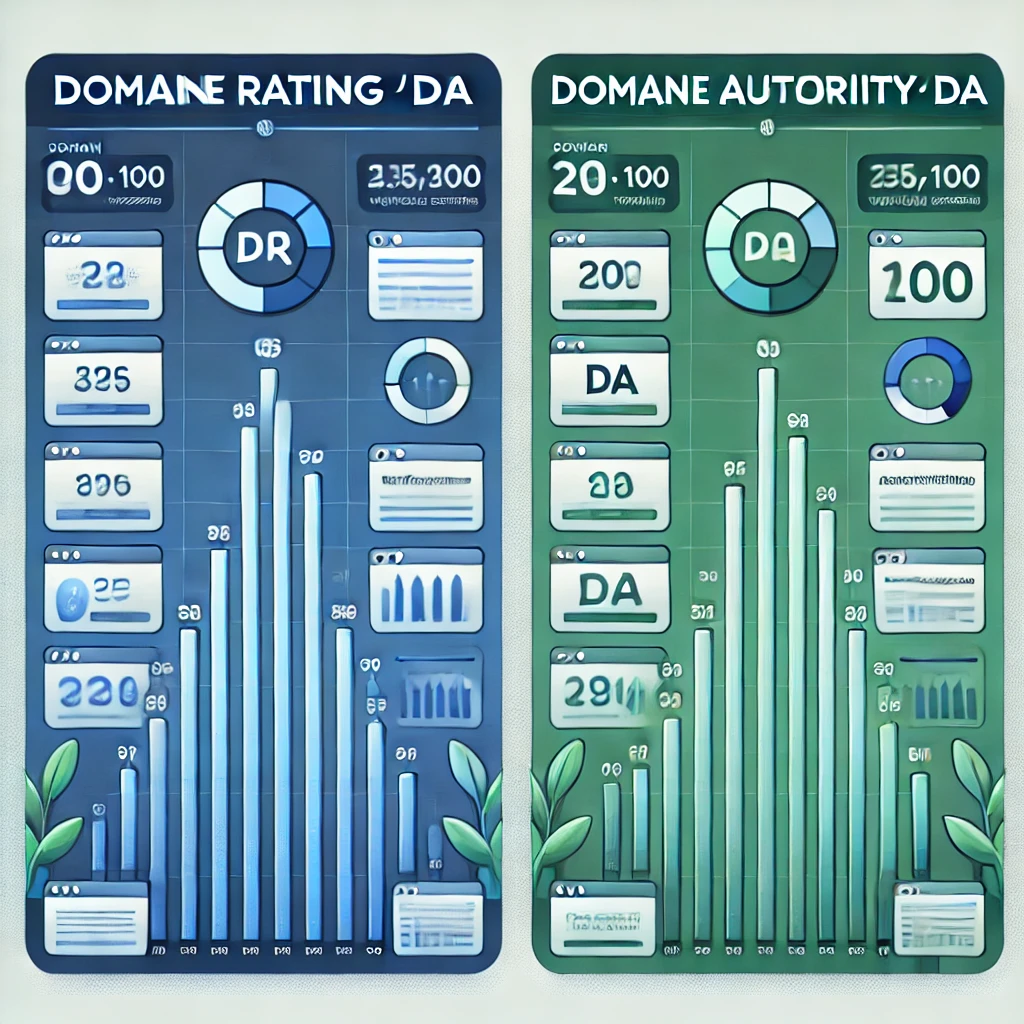

Domain Rating vs Domain Authority
In the world of Search Engine Optimization (SEO), understanding how your website’s credibility and performance are measured is crucial for digital success. Two of the most commonly used metrics for evaluating a website’s authority are Domain Rating (DR) and Domain Authority (DA). While both of these metrics serve similar purposes—indicating the strength of a website’s backlink profile and its potential to rank in search engines—they are calculated differently and have distinct impacts on your SEO strategy.
This article dives into the differences between Domain Rating and Domain Authority, their significance, and how each affects your website’s ranking.
Table of Contents
ToggleWhat Is Domain Rating (DR)?
Domain Rating (DR) is a metric developed by Ahrefs, a popular SEO tool, to quantify the strength of a website’s backlink profile. DR is calculated on a scale from 0 to 100, with higher scores indicating stronger backlink profiles and, thus, a higher probability of ranking well on search engines like Google.
Ahrefs’ DR specifically focuses on the quality and quantity of backlinks that point to a website. The higher the number of quality backlinks (from authoritative websites), the higher your website’s DR will be. It’s essential to note that DR is relative—it compares the backlink profiles of other sites, so if a competitor gains more quality backlinks, their DR can increase, potentially lowering yours.
Key Factors That Affect Domain Rating:
- Backlink Quality: The authority of the websites linking to your site. Backlinks from high-authority domains boost DR more significantly than links from lower-authority domains.
- Backlink Quantity: The number of unique referring domains that link to your website.
- DoFollow vs. NoFollow Links: Only “DoFollow” links count towards increasing DR, as these links pass on authority.
- Internal Link Structure: How effectively your internal links connect pages can also influence your overall domain health, though its direct impact on DR is less significant than external backlinks.
Ahrefs DR focuses exclusively on the backlink profile and does not consider other SEO factors like on-page content quality or keyword optimization. This makes it a purely link-based metric, which can be valuable for assessing the link-building success of your website.
What Is Domain Authority (DA)?
Domain Authority (DA) is a metric developed by Moz, another prominent SEO tool, and is also calculated on a scale from 0 to 100. Like DR, DA reflects a website’s potential to rank well on search engine results pages (SERPs). However, Moz uses a broader range of factors to calculate DA, making it a more holistic metric compared to Ahrefs’ DR.
While backlinks are still a crucial component, Moz’s DA also considers various other SEO factors, including:
- Backlink Profile: Similar to DR, Moz assesses the quality and quantity of inbound links pointing to your site.
- On-Page SEO: Content quality, keyword optimization, and user experience can affect DA.
- Website Performance: Metrics like website loading speed and mobile responsiveness are considered in DA.
- Spam Score: Moz has a spam score that assesses the likelihood of a site being spammy, which can negatively impact your DA if it’s too high.
- Domain Age: Older, more established domains may have a slight edge when it comes to DA compared to newer websites.
How DA Is Calculated:
Moz uses a machine learning algorithm to calculate DA, considering various SEO factors in addition to backlinks. The exact algorithm is proprietary and frequently updated to keep pace with changes in search engine algorithms.
Because DA is based on a range of SEO signals, it can provide a more comprehensive view of your website’s ability to rank, especially in comparison to the more narrowly focused DR.
Key Differences Between Domain Rating and Domain Authority
While DR and DA might seem similar at first glance, there are critical distinctions that every SEO professional or marketer should understand:
1. Source and Calculation
- Domain Rating (DR): Calculated by Ahrefs and focuses mainly on the strength and quantity of backlinks.
- Domain Authority (DA): Developed by Moz and uses a more diverse set of factors, including on-page SEO, domain age, and backlink profile.
2. Range of Metrics
- DR: Focuses solely on backlinks, which makes it a pure link-based metric.
- DA: Incorporates several SEO-related factors, making it more comprehensive and representative of overall website health.
3. Updates
- DR: Updated frequently, often reflecting changes in the backlink landscape quickly.
- DA: Updates are periodic and may take time to reflect changes in a website’s overall SEO performance.
4. Comparability
- DR: Relative to other sites, so your DR score may change if competing sites improve their backlink profiles, even if nothing changes on your site.
- DA: Absolute score calculated using machine learning, so it’s less likely to fluctuate based solely on competitors’ actions.
5. Interpretation
- DR: Best used for evaluating your link-building efforts.
- DA: Useful for a more holistic evaluation of your site’s overall SEO performance.
Domain Rating and Domain Authority Impact SEO
Both DR and DA have significant implications for your SEO strategy:
1. Backlink Strategy
Both DR and DA underscore the importance of acquiring high-quality backlinks. DR is more laser-focused on this, so if you’re aiming for an increase in DR, you’ll want to focus heavily on link-building strategies that acquire links from high-authority websites.
2. SEO Health
DA takes a broader approach. A higher DA not only reflects strong backlinks but also solid on-page SEO, user experience, and domain authority over time. As a result, DA is often used by SEO professionals to get a comprehensive understanding of a website’s health and its ability to rank for targeted keywords.
3. Competitor Analysis
Both metrics are useful for competitor analysis, but in different contexts. If you want to compare link-building efforts, DR might be the more appropriate metric. If you want a more well-rounded comparison that includes various SEO aspects, DA will provide a broader scope.
Which Metric Should You Focus On?
Whether you should prioritize DR or DA depends on your goals. If you are focused on link-building and off-page SEO, DR might be a more relevant metric for you. On the other hand, if you are aiming for an overall improvement in SEO performance, including content quality and on-page SEO, DA is the more appropriate metric to track.
Conclusion
Both Domain Rating and Domain Authority offer valuable insights into your website’s ability to perform well on search engines. While DR emphasizes the importance of a robust backlink profile, DA provides a more holistic measure of your website’s overall SEO health. Understanding the differences between these metrics will help you tailor your SEO strategies and make informed decisions to improve your site’s rankings and performance.
Related Posts
Buy Backlinks
Fantastic goods from you, man. I have understand your stuff previous to and you are just extremely excellent. I really like what you have acquired here, really like what you’re stating and the way in which you say it. You make it entertaining and you still care for to keep it sensible. I can not wait to read far more from you. This is really a terrific site.






















3 comments